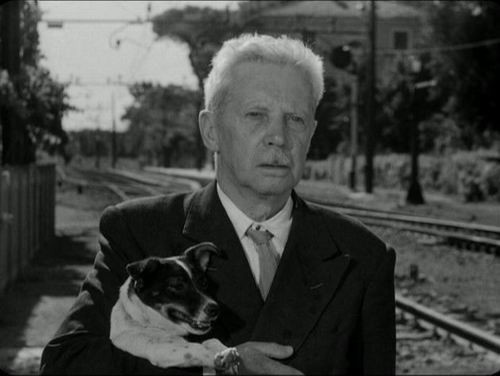November 10, 1955 [Umberto D.]
Grandpop was a quiet man, a tidy little fellow who sat on his front porch, his vest and shirt buttoned to the top, his chin pointing the way with certainty—and everyone on his block knew they could trust him. And while he saw through most people, he maintained his own Sicilian counsel; you might guess his displeasure by a small shift in the temperature of his look, but that was about all—and often just about enough. With my grandmother he'd cut loose a little, rolling his eyes and scolding her; but he did everything for her—much to her peril after his death, when she realized she knew little about the house and the world outside it, how things worked, where they belonged. While he lived, he worked; and while he knew what was wrong with the world, he let it alone as much as he could.
The little old man in Umberto D. has a great deal less than my grandfather, but the two are wandering around in my head together, little men passed by, but trying to keep their shirts buttoned—except Umberto is losing everything, home and dignity both torn up beneath his very feet. All he has is Fike, his little dog—"a mutt with intelligent eyes," as he puts it, the two of them children—even younger, it seems, than the pregnant girl he befriends, and whose little round face is often wet with tears. It is a sad world they live in, a miniature Italian opera, with a slow approach to the big finish—Umberto deciding to End It All, having kept his own counsel for so long only Fike knows. And the intelligent mutt's decision to foil the foolish old man is more than a rescue, it is a friend's forgiveness, with the other apologizing, the two of them in the end under a big sky at once blank and beautiful, the sadness still waiting—but held off for a while, left to be itself, while the two boys play with a pine cone.



Comments
Post a Comment